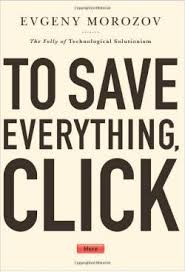Evgeny Morozov, solutionism and the politics of usability

Luke Fernandez, Manager of Program and Technology Development at Weber State University, has published a review of Evgeny Morozov’s To Save Everything Click Here that explores the intersection between UX and political theory.
“As a political theorist and software developer I particularly appreciate Morozov’s attempt to battle solutionism by injecting politics back into tool building. However, I’m also cognizant of its limitations. Pace Morozov and and others who hold up the civic republican tradition, I’m less inclined to think of politics and morality as concerns that confer the deepest meaning on human life. And since I work in the company of other developers I know that they display similar dispositions. Call me a philistine, but most of the time I’d rather be doing something else than being a political being. Morozov, in his erudition, summons media theorist Michael Schudson to describe this sensibility as the plight of the “political backpacker.†Backpackers like to go into the wilderness and spend some time cooking and camping for themselves. But soon enough most backpackers emerge from the wildernesss and are happy to relegate cooking and sheltering to other entities than themselves. Political backpackers feel analogous sentiments. Occasional forays into politics make us feel good because they help us to grow as political beings. But most of us would consider it a curse to spend all or even the majority of our lives in that realm. (Even Steve Jobs, who obviously got a jag from his very public Apple presentations reported that he was happiest when he wandered into Jonathan Ive’s private workshop and spent time handling Apple product prototypes.)
We want our technologies to do the same for us as well. For a better and richer life we want–and have a duty– to confront our relationship to our technology and consider how it constructs our relationship with others and the world around us. So our technologies shouldn’t be frictionless all the time. They shouldn’t permanently shield us from politics. But most of the time we just want our technologies to exhibit the same behaviors that Job’s and Ive’s have glowingly attributed to Apple’s products: “it just works!†This then is the design dilemma we face in a nation that wants to be faithful to both its Liberal and Civic Republican traditions: How do we develop technologies that enlarge our capacity to be political beings while at the same time catering to our more pedestrian and commercially oriented selves?”



